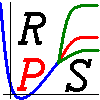 |
An Extensible Toolkit for
Resource Prediction in
Distributed Systems |
 |
Peter A. Dinda
Prescience Lab
Department of Computer Science
Northwestern University
RPS is an extensible toolkit for designing, building, and
evaluating systems that predict the dynamic behavior of resources
in distributed systems. The core of RPS is written in C++ and is
portable to any platform with a relatively recent C++ compiler.
Components
RPS includes the following components.
You may be interested in some screen
shots or a movie (AVI, 98 MB)
of a web front-end built on top of RPS.
Documentation
The design of RPS is described in the following journal paper:
with additional detail provided in this older technical report:
The design of Tsunami, RPS's wavelet toolkit is described in the following technical report.
The documentation tree that ships with RPS can be viewed here.
A large number of research results have grown out of using RPS. These
are described in papers available from the Prescience Lab and here.
Download
The current release is 2.0. It is available in binary form for Linux,
Cygwin, and Windows environments, and in source code form that has
been tested on Red Hat, Cygwin, and Windows environments on Intel
processors, specifically, Red Hat 9, Cygwin 1.5.7, and Windows XP.
The build system also includes provisions for build on Solaris/Sparc
and on Digital Unix/Alpha. The system should compile
straightforwardly on any environment that provides GCC.
RPS is subject to a LICENSE.
The previous release is RPS-1.0-rc2
(gzipped tar file, 2 MB). It is only distributed in source
form. It has been verified to compile on Red Hat Linux 6.2 and 7.0,
Digital Unix 4.0D, Solaris, and Cygwin using gnu make and gcc 2.95.2
or better, and on Windows 2000 using Visual Studio 6.0.
An early version of RPS was as a part of the CMU Remos system, which
can be downloaded from here. The directory tree is
"PPS".
Related Software
You may also be interested in the following software that can be used with RPS.
KNOWN BUGS
Look here.
Getting Help
RPS comes with no warranty or support of any kind. Also keep in mind that it is a research
tool. Nonetheless, the following informal support options exist.
Please do not send help mail directly to Peter Dinda or his students. It will probably go unanswered.
Contributors
Peter A Dinda
Last modified: Mon Oct 31 13:37:09 CDT 2011



